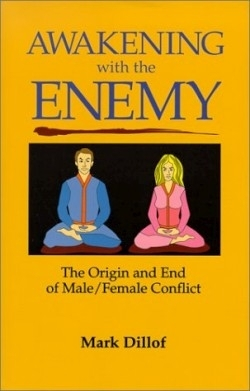
Awakening with the Enemy
The Origin and End of Male/Female Conflict
William Blake’s paradox, “without contraries is no progression,” could well serve as an epigraph to a book premised on the belief that perceiving the contradictions at the heart of erotic love is the only route to romantic and personal happiness. Dillof, founder of The Philosophy Clinic, has written what just might be the vade mecum for all disillusioned lovers who wonder why initial attraction often turns to distraction.
Using a method called “ontoanalysis” based on Eastern wisdom, Dillof believes that no amount of psychotherapy or self-help books can change the fact that men and women perceive reality in opposite or antinomial terms and that the war of the sexes is instead “a war of different visions of life.” Since erotic love is based on seeking in another what one lacks in oneself, it is by nature a contradiction since one cannot find the eternal in the finite. Accepting that erotic love is no antidote enables people to use the “transformative power of the impossible” to move beyond masculine and feminine polarities to a new self-awakening.
Although it sounds rather cosmic, the book is very accessible and offers a radically different approach to understanding conflicts in love, even if the premise isn’t accepted. References range from Mick Jagger to Martin Buber. Also provided are a glossary, recommended reading and an index.
The first two parts are filled with examples that enlighten as well as entertain. Part I disentangles the masculine and feminine approaches to reality and their antinomial nature. Part II explains how efforts to unify erotic polarities only shifts the suffering without eliminating it. The movie Titanic is used to exemplify one such union, “Women as Androgyne,” in which “men are required to live as psychological eunuchs so that women can be all they can be,” exemplified by Leo DiCaprio’s character dying once he has infused Kate Winslet’s character with self-reliance.
The last part attempts to show how perceiving contradictions “offers an escape from the labyrinth of suffering” and how people can instead choose to live at “a level of awareness beyond the point where the (two) polarities are opposed” and where identity is based instead on a “formless absolute.” This awareness is reached through questioning and a “thinking with one’s gut.” More space could have been devoted to the actual how-to since insight is not always an inevitable result of questioning, especially for those who need structure. Nevertheless, it’s essential reading for those who not only sleep together, but wish to “awaken” together.
Reviewed by
Judy Hopkins
Disclosure: This article is not an endorsement, but a review. The publisher of this book provided free copies of the book to have their book reviewed by a professional reviewer. No fee was paid by the publisher for this review. Foreword Reviews only recommends books that we love. Foreword Magazine, Inc. is disclosing this in accordance with the Federal Trade Commission’s 16 CFR, Part 255.
